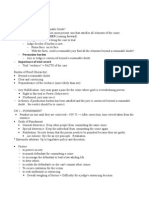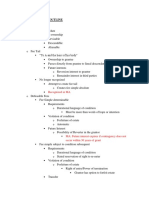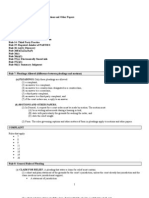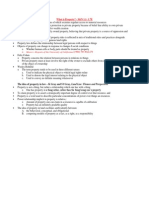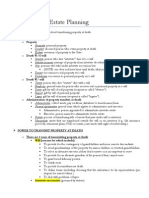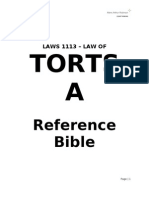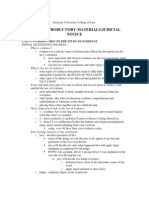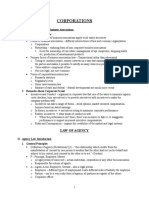Fee Simple
Fee Simple
Uploaded by
georaw9588Copyright:
Available Formats
Fee Simple
Fee Simple
Uploaded by
georaw9588Copyright
Available Formats
Share this document
Did you find this document useful?
Is this content inappropriate?
Copyright:
Available Formats
Fee Simple
Fee Simple
Uploaded by
georaw9588Copyright:
Available Formats
FEE SIMPLE innocent conveyance. Hist.
A leaseholder's conveyance of the leaseholder's property interest that is, something less than a fee simple. The conveyance is of an equitable interest. [Cases: Landlord and Tenant 74. C.J.S. Landlord and Tenant 30, 53.] fee tail estate ad remanentiam (ad rem-<<schwa>>-nen-shee-<<schwa>>m). An estate in fee simple. FEE INTEREST fee interest. 1.FEE(2).2.FEE SIMPLE. 3.FEE TAIL. 4.Oil & gas. Ownership of both the surface interest and the mineral interest. ALLODIUM allodium (<<schwa>>-loh-dee-<<schwa>>m), n. An estate held in fee simple absolute. Also spelled alodium. Also termed alod; alode. [Cases: Estates in Property 5. C.J.S. Estates 1112.] In this country, one who has full ownership of land is said to own it allodially that is, free of feudal services and incidents. Thomas F. Bergin & Paul G. Haskell, Preface to Estates in Land and Future Interests 18 (2d ed. 1984).
BARGAIN AND SALE bargain and sale. 1. A negotiated transaction, usu. for goods, services, or real property. 2.Hist. A written agreement for the sale of land whereby the buyer would give valuable consideration (recited in the agreement) without having to enter the land and perform livery of seisin, so that the parties equitably raised a use in the buyer. The result of the transaction was to leave the legal estate in fee simple in the seller and to create an equitable estate in fee simple in the buyer until legal title was transferred to the buyer by delivery of a deed. In most jurisdictions, the bargain and sale has been replaced by the statutory deed of grant. [Cases: Deeds 22.C.J.S. Deeds 16.] BARGAINED-FOR EXCHANGE bargained-for exchange.Contracts. A benefit or detriment that the parties to a contract agree to as the price of performance in return for a promise. The Restatement of Contracts (Second) defines consideration exclusively in terms of bargain, but it does not mention benefit or detriment. BARGAIN SALE bargain sale.A sale of property for less than its fair market value. For tax purposes, the difference between the sale price and the fair market value must be taken into account. And bargain sales between family members may lead to gift-tax consequences. Also termed bargain purchase. BARGAIN THEORY OF CONSIDERATION bargain theory of consideration. The theory that a promise or performance that is bargained for in exchange for a promise is consideration for the promise. This theory underlies all bilateral contracts. See bilateral contract under CONTRACT. [Cases: Contracts 50. C.J.S. Contracts 87.]
[C]lassical contract theory tended to associate the doctrine of consideration with the concept of bargain. The emphasis of classical law shifted away from actual benefits and detriments to the mutual promises which constitute a wholly executory contract. American lawyers developed from this trend a bargain theory of consideration and similarly in English law a more modern basis for the doctrine of consideration was found by some lawyers in the notion that a contract is a bargain in which the consideration is the price of the bargain. Allied to this is the supposed rule that nothing can be treated as a consideration unless it is seen by the parties as the price of the bargain. P.S. Atiyah, An Introduction to the Law of Contract 119 (3d ed. 1981). BARGAIN bargain,n. An agreement between parties for the exchange of promises or performances. A bargain is not necessarily a contract because the consideration may be insufficient or the transaction may be illegal. See BARGAIN SALE; informal contract under CONTRACT. [Cases: Contracts 1.C.J.S. Contracts 23, 9, 12.] bargain,vb. A bargain is an agreement of two or more persons to exchange promises, or to exchange a promise for a performance. Thus defined, bargain is at once narrower than agreement in that it is not applicable to all agreements, and broader than contract since it includes a promise given in exchange for insufficient consideration. It also covers transactions which the law refuses to recognize as contracts because of illegality. Samuel Williston, A Treatise on the Law of Contracts 2A, at 7 (Walter H.E. Jaeger ed., 3d ed. 1957). catching bargain.An agreement on unconscionable terms to purchase real property from or loan money secured by real property to a person who has an expectant or reversionary interest in the property. illegal bargain.A bargain whose formation or performance is criminal, tortious, or otherwise contrary to public policy. BITING RULE biting rule. A rule of construction that once a deed or will grants a fee simple, a later provision attempting to cut down, modify, or qualify the grant will be held void. [Cases: Deeds 124; Wills 601(2).C.J.S. Deeds 245.] CLAIM OF RIGHT claim of right. 1.Hist. A criminal plea, usu. to a theft charge, by a defendant asserting that the property was taken under the honest (but mistaken) belief that the defendant had a superior right to the property. The claim of right could also be raised in defense against bigamy if a defendant honestly believed that an earlier marriage had been legally dissolved. It has been superseded by a defense of honesty. 2.Hist. An owner's action to recover unjustly taken land in fee simple by employing a writ of course. See WRIT OF COURSE. 3.CLAIM OF OWNERSHIP. CLAIM-OF-RIGHT DOCTRINE claim-of-right doctrine.Tax. The rule that any income constructively received must be reported as income, whether or not the taxpayer has an unrestricted claim to it. [Cases: Internal Revenue 3086, 3118. C.J.S. Internal Revenue 5354, 63.] CLAIM OF TITLE claim of title. See CLAIM OF OWNERSHIP. CLAIM PRECLUSION claim preclusion. See RES JUDICATA. [T]he principal distinction between claim preclusion and issue preclusion is ... that the former forecloses litigation of matters that have never been litigated. This makes it important to know the dimensions of the claim that is foreclosed by bringing the first action, but unfortunately no precise definition is possible. Charles Alan Wright, The Law of Federal Courts 100A, at 723 (5th ed. 1994).
CLAIM-PROPERTY BOND claim-property bond. See replevin bond under BOND(2). CLAIMS ADJUSTER claims adjuster. See insurance adjuster under ADJUSTER. CONVEYANCER conveyancer (k<<schwa>>n-vay-<<schwa>>n-s<<schwa>>r). A lawyer who specializes in real-estate transactions. In England, a conveyancer is a solicitor or licensed conveyancer who examines title to real estate, prepares deeds and mortgages, and performs other functions relating to the transfer of real property. CONVEYANCING conveyancing (k<<schwa>>n-vay-<<schwa>>n-sing). The act or business of drafting and preparing legal instruments, esp. those (such as deeds or leases) that transfer an interest in real property. Conveyancing is the art or science of preparing documents and investigating title in connection with the creation and assurance of interests in land. Despite its connection with the word conveyance, the term in practice is not limited to use in connection with old system title but is used without discrimination in the context of all types of title. Peter Butt, Land Law 7 (2d ed. 1988). Conveyancing may be regarded as the application of the law of real property in practice. Robert E. Megarry & M.P. Thompson, A Manual of the Law of Real Property 125 (6th ed. 1993).
CONVEYANCING COUNSEL conveyancing counsel. Three to six lawyers who are appointed by the Lord Chancellor to assist the High Court of Justice with opinions in matters of property titles and conveyancing. Also termed conveyancing counsel of the Supreme Court; (formerly) conveyancing counsel to the Court of Chancery. deed in fee. A deed conveying the title to land in fee simple, usu. with covenants. deed in lieu of foreclosure. A deed by which a borrower conveys fee-simple title to a lender in satisfaction of a mortgage debt and as a substitute for foreclosure. This deed is often referred to simply as deed in lieu. [Cases: Mortgages 293. C.J.S. Mortgages 441443.] DEFEASIBLE defeasible, adj. (Of an act, right, agreement, or position) capable of being annulled or avoided <defeasible deed>. See fee simple defeasible under FEE SIMPLE . defeasibility,n.
You might also like
- Remedies Outline Spring 2010 Roman FIUDocument64 pagesRemedies Outline Spring 2010 Roman FIUjop1229100% (3)
- Torts Outline 2012Document17 pagesTorts Outline 2012cmm1221No ratings yet
- Crim OutlineDocument62 pagesCrim Outlinegialight100% (1)
- McCormick - Handbook of The Law of EvidenceDocument5 pagesMcCormick - Handbook of The Law of Evidencemendel28No ratings yet
- Conflict of Law OHara 2003Document20 pagesConflict of Law OHara 2003CC8527563No ratings yet
- 2010.final - Hing.evidence OutlineDocument106 pages2010.final - Hing.evidence Outlineharrier666No ratings yet
- Hls LRW Fall 2016 Week 2Document14 pagesHls LRW Fall 2016 Week 2Alex KozinskiNo ratings yet
- Criminal Law OutlineDocument25 pagesCriminal Law OutlinechristiandemeNo ratings yet
- Freehold Estates ChartDocument1 pageFreehold Estates Chartpardis_saleki100% (1)
- Wills Handout PDFDocument52 pagesWills Handout PDFMichael CarrNo ratings yet
- Age of MajorityDocument2 pagesAge of Majoritygeoraw9588100% (7)
- King Crim ProDocument65 pagesKing Crim ProZackary Thomas Gibbons100% (1)
- Civil Procedure OutlineDocument23 pagesCivil Procedure OutlineThomas Jefferson100% (1)
- The Justiciability Doctrines: Case or ControversyDocument4 pagesThe Justiciability Doctrines: Case or ControversyApple ObiasNo ratings yet
- Property Lecture OutlineDocument30 pagesProperty Lecture Outlinetennis123123No ratings yet
- Conflict of LawsDocument5 pagesConflict of LawsCharles LeventNo ratings yet
- Crim - Pro OutlineDocument78 pagesCrim - Pro OutlinekwakmariaNo ratings yet
- Evidence OutlineDocument9 pagesEvidence OutlineRebecca AllenNo ratings yet
- Torts OverviewDocument8 pagesTorts OverviewKatherine McClintockNo ratings yet
- Voluntary Act Voluntary Act: Common Law M PC Actus R e UsDocument7 pagesVoluntary Act Voluntary Act: Common Law M PC Actus R e Uslnm10No ratings yet
- International Law OutlineDocument14 pagesInternational Law OutlineTheresa CalimagNo ratings yet
- Torts OutlineDocument35 pagesTorts OutlinelearninghandNo ratings yet
- Criminal Law Skeletal Outline: Prof. CrumpDocument16 pagesCriminal Law Skeletal Outline: Prof. CrumpmatsuyukiNo ratings yet
- FRCP Outline From OnlineDocument16 pagesFRCP Outline From Onlinemeteor1216No ratings yet
- Civil Procedure OutlineDocument10 pagesCivil Procedure OutlineMeenaNo ratings yet
- Hoffa v. United States, 387 U.S. 231 (1967)Document3 pagesHoffa v. United States, 387 U.S. 231 (1967)Scribd Government DocsNo ratings yet
- Civil Procedure Outline - Semester 1Document49 pagesCivil Procedure Outline - Semester 1Lauren C WalkerNo ratings yet
- Crim Pro Two OUTLINEDocument25 pagesCrim Pro Two OUTLINEannamelicharNo ratings yet
- ContractsDocument125 pagesContractsMorgan ColesNo ratings yet
- Agencyandpartnership 12712275603502 Phpapp01Document48 pagesAgencyandpartnership 12712275603502 Phpapp01Atif AshrafNo ratings yet
- ST Assign 11 Supplemental OutlineDocument2 pagesST Assign 11 Supplemental Outlinepcessweetie8No ratings yet
- Hearsay: 3 Exclusions From This RuleDocument3 pagesHearsay: 3 Exclusions From This RuleRobyn Schiff RevelsonNo ratings yet
- CasesDocument4 pagesCasespgdl2011No ratings yet
- Concepts of Property Law NotesDocument9 pagesConcepts of Property Law Notesdossier5No ratings yet
- Crim Law OutlineDocument9 pagesCrim Law OutlineEmma Trawick BradleyNo ratings yet
- Civ Pro 1 OutlineDocument35 pagesCiv Pro 1 OutlineSavana DegroatNo ratings yet
- Civil Procedure Outline 2011Document36 pagesCivil Procedure Outline 2011Ian Ghrist50% (2)
- Civil Procedure II OutlineDocument25 pagesCivil Procedure II OutlineKit-Cat NguyenNo ratings yet
- Understanding Criminal Procedure: Volume 1: InvestigationDocument518 pagesUnderstanding Criminal Procedure: Volume 1: InvestigationFrederickSharmaNo ratings yet
- Customary Law Without CustomDocument37 pagesCustomary Law Without CustomhenfaNo ratings yet
- Property 1 Page OutlineDocument3 pagesProperty 1 Page Outlinesmj226No ratings yet
- Legal Latin Phrases and MaximsDocument3 pagesLegal Latin Phrases and MaximsKeith Yves BatislaongNo ratings yet
- Admissible:Inadmissible Character EvidenceDocument7 pagesAdmissible:Inadmissible Character Evidencemdean10No ratings yet
- Bankruptcy HandoutDocument14 pagesBankruptcy HandoutbryamonNo ratings yet
- Smith Remedies Winter 2015-UnlockedDocument17 pagesSmith Remedies Winter 2015-UnlockedMark Michael StrageNo ratings yet
- Best Property Ocheje WinterDocument135 pagesBest Property Ocheje WinterBob StevensonNo ratings yet
- W&T Good OUTLINEDocument111 pagesW&T Good OUTLINElawstudent10No ratings yet
- Criminal Law Outline in ColorDocument20 pagesCriminal Law Outline in Colorsarahlaraa100% (1)
- Contract (Obyrne Sem 2)Document41 pagesContract (Obyrne Sem 2)JjjjmmmmNo ratings yet
- Introduction To Estate Planning: Wills, Trusts & Estates Professor Catania Fall 2012Document35 pagesIntroduction To Estate Planning: Wills, Trusts & Estates Professor Catania Fall 2012Alex GarrigaNo ratings yet
- Law of Torts A Semester 1 2008Document99 pagesLaw of Torts A Semester 1 2008valentinejnNo ratings yet
- Crim Law OutlineDocument29 pagesCrim Law OutlineMatthew NewtonNo ratings yet
- Property Outline - CenteredDocument67 pagesProperty Outline - CenteredMichael ZoellnerNo ratings yet
- Ivil Rocedure: Ersonal Urisdiction HO CAN BE SuedDocument45 pagesIvil Rocedure: Ersonal Urisdiction HO CAN BE SuedVicki GokhmanNo ratings yet
- Fall 2010 OutlineDocument7 pagesFall 2010 OutlinePatrick HarringtonNo ratings yet
- Unit 1: Introduction To The Study of EvidenceDocument101 pagesUnit 1: Introduction To The Study of Evidencemelissa_diaz_3No ratings yet
- Corporations Allen NYUDocument110 pagesCorporations Allen NYUxuqikunNo ratings yet
- LSE Key Concepts: Criminal Law W I C B ? M R - I: Martin v. State VariationsDocument7 pagesLSE Key Concepts: Criminal Law W I C B ? M R - I: Martin v. State VariationsLeisa R RockeleinNo ratings yet
- Void, Voidable, VoidabilityDocument1 pageVoid, Voidable, Voidabilitygeoraw9588No ratings yet
- Us Person (Irs)Document2 pagesUs Person (Irs)georaw9588No ratings yet
- UsufructDocument2 pagesUsufructgeoraw9588No ratings yet
- Ultra Vires ( L-TR Vi-Reez Alsoveer-Eez), AdjDocument1 pageUltra Vires ( L-TR Vi-Reez Alsoveer-Eez), Adjgeoraw9588No ratings yet
- Agenda. A List of Things To Be Done, As Items To Be Considered at A MeetingDocument1 pageAgenda. A List of Things To Be Done, As Items To Be Considered at A Meetinggeoraw9588No ratings yet
- Asset Based FinancingDocument2 pagesAsset Based Financinggeoraw9588No ratings yet
- AUCTOR (Grantor)Document1 pageAUCTOR (Grantor)georaw9588No ratings yet
- Insurance Cases Judicial Conclusion That Adhesion Contracts Frequently Defeat The Reasonable Expectations of The PartiesDocument1 pageInsurance Cases Judicial Conclusion That Adhesion Contracts Frequently Defeat The Reasonable Expectations of The Partiesgeoraw9588No ratings yet
- AB INITIO (From The Beginning)Document1 pageAB INITIO (From The Beginning)georaw9588No ratings yet
- Adversary ProceedingDocument3 pagesAdversary Proceedinggeoraw9588No ratings yet
- Noun1.canon Law - The Body of Codified Laws Governing The Affairs of A Christian ChurchDocument6 pagesNoun1.canon Law - The Body of Codified Laws Governing The Affairs of A Christian Churchgeoraw9588No ratings yet







